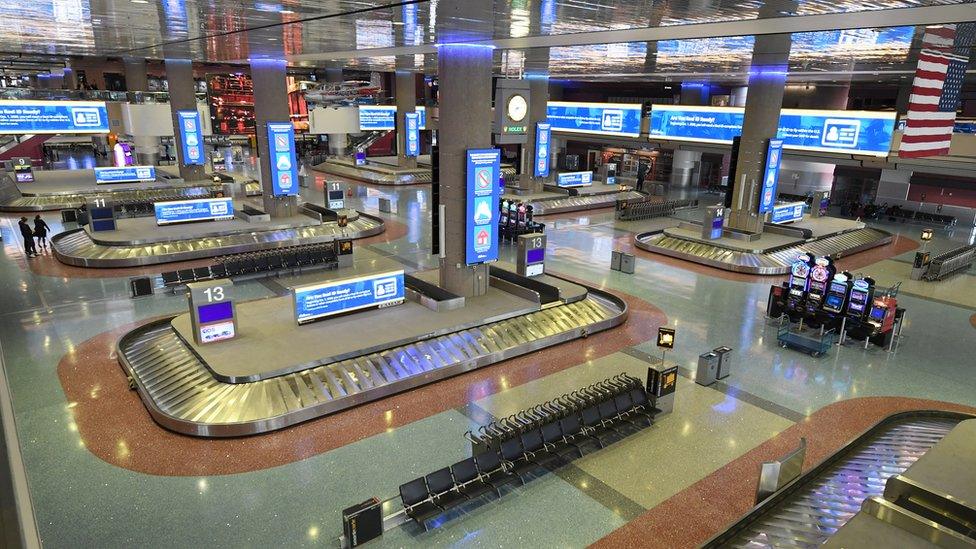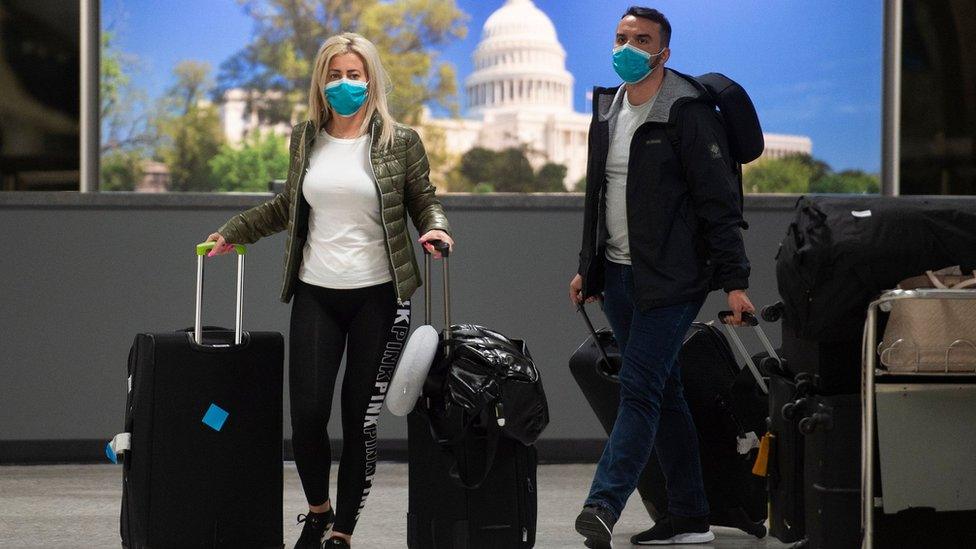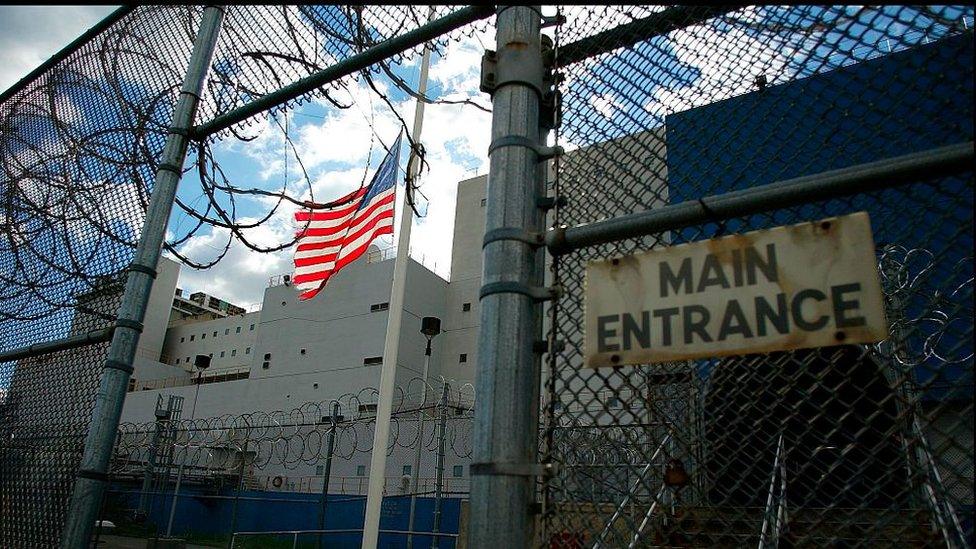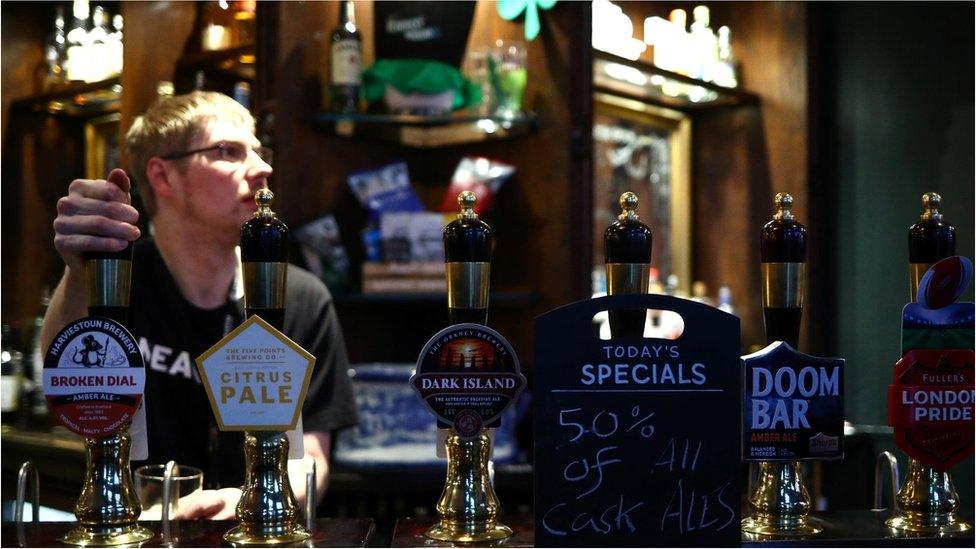Coronavirus: California issues state-wide 'stay at home' order
- Published
California governor: "We need to make tough decisions"
California has issued a "stay at home" order to residents as it tries to stem the march of the coronavirus across the most populous US state.
Governor Gavin Newsom told Californians they should only leave their homes when necessary during the pandemic.
He earlier estimated more than half of the 40 million people in his state would contract Covid-19 in just the next two months.
The virus has claimed 205 lives in the US and infected more than 14,000.
Globally nearly 250,000 patients have tested positive for the respiratory illness and more than 10,000 have died.
California's mandate is the most drastic step taken by a US state to combat Covid-19.
On Friday, New York State also escalated containment efforts, ordering all non-essential employees to work from home, barring evictions and issuing social distancing rules for citizens.
What does California's order mean?
Mr Newsom said on Thursday evening: "This is a moment we need to make tough decisions. We need to recognise reality."
The governor did not offer an end date to the order in his address, though he noted this is "not a permanent state, this is a moment in time".
"We will look back at these decisions as pivotal."
California is among the first US states to bring in blanket restrictions. Earlier this week Nevada said non-essential businesses should close for 30 days.
The governor's order will allow residents to leave their homes to buy groceries or medicine, or walk a dog or take exercise, but seeks to limit public interactions.
It will force businesses deemed non-essential to close, while allowing others including grocery stores, pharmacies, banks and petrol stations to stay open.
About half of the state's population is already subject to similar stringent measures, including the city of San Francisco.
Students on spring break defy Covid-19 warnings
The Democratic governor said parts of the state were seeing infection rates double every four days.
Speaking at a press conference in Sacramento, Mr Newsom said the virus "will impact about 56% of us - you do the math in the state of California, that's a particularly large number".
The governor did not clarify how his officials had calculated that figure, which would amount to nearly 22.5 million infected people.
But his spokesman acknowledged the estimate did not take into account the mitigation measures being implemented state-wide.
Police have said they will take a soft approach to enforcing the order. A number of local departments told US media, external they will not arrest individuals ignoring the policy - though violating it can lead to a citation - and hope issuing warnings will keep people at home.

More hospital beds needed
David Willis in Los Angeles reports
This is the most drastic measure that any US state governor has taken to try to tame the virus - going further even than New York, which has more coronavirus cases than California.
Speaking from the state's emergency operations centre in Sacramento - a place that is normally used to coordinate the response to wildfires or earthquakes - Mr Newsom called on people here to only leave their homes if it was absolutely necessary - to get food, collect medicines, or care for a friend or relative.
He said said that based on projections nearly 20,000 more hospital beds would be needed to deal with the effects of the outbreak than the state could currently provide.
He is asking Congress for a billion dollars in federal funding to support California's response to the crisis, and calling for a navy hospital ship to be deployed to the Port of Los Angeles to help deal with the anticipated surge in patients.

So far, California has recorded fewer than 1,000 cases of the virus and 19 deaths, according to the Los Angeles Times.
On Wednesday Mr Newsom wrote to President Donald Trump appealing for urgent federal help.
On Thursday Treasury Secretary Steve Mnuchin said the Senate needed to pass a $1 trillion economic rescue plan by Monday.
The Coronavirus Aid, Relief, and Economic Security Act would include hundreds of billions of dollars worth of loans to big corporations and small businesses, large corporate tax cuts and $1,200 (£1,000) cheques for taxpayers.


A SIMPLE GUIDE: What are the symptoms?
YOUR THIRD HAND: How do you clean your smartphone?
BORED KIDS: Should you let your children play with others?
GETTING READY: How prepared is the US?
DOING GOOD: Kind Canadians start 'caremongering' trend

Where are the other US coronavirus 'hot zones'?
Along with New York and Washington, California is among the US states worst hit by the coronavirus pandemic.
On Thursday alone, New York City's recorded caseload of Covid-19 more than doubled to 3,954 - greater than the confirmed number of coronavirus patients in the whole of the UK.
New York Governor Andrew Cuomo has escalated containment efforts by mandating all non-essential workers to stay at home as cases continue to rise in the state. He has also ordered a moratorium on all residential and commercial evictions for the next 90 days.
"Sixteen days ago, we were at zero [cases]. Today we are at 2,900. Those numbers are why we're taking these actions."
Mr Cuomo has also issued additional rules for citizens. Vulnerable individuals should only go outside for solitary exercise, avoid public transport, and wear masks. Non-vulnerable groups are barred from non-essential gatherings outside of private homes, including group exercise, and must practice social distancing of at least six feet (2m).
"This is not life as usual," the governor said. "Accept it and realise it and deal with it."
He noted the new rules, which go into effect Sunday, will be enforced through a civil fine and mandatory closure for any businesses not in compliance with this guidance. But Mr Cuomo said he would not call it a shelter-in-place order.
The governor is also speaking with leaders of bordering states to take regional action.
The governor noted the surge in New York coronavirus cases was due to increased testing capability and that the state was testing more people per capita than China or South Korea, with 10,000 tests processed last night.
New York Mayor Bill de Blasio told CNN the most populous city in the US would run out of medical supplies within three weeks if the "explosion" of infections continued at such a rate.
He implored the federal government to help New York obtain 15,000 ventilators, three million respirator masks, 50 million surgical masks and 45 million gowns, gloves and coveralls.
The mayor said the virus had so far claimed the lives of 26 people in the city.

A nearly empty baggage claim area at McCarran International Airport in Las Vegas, Nevada
The US Department of State, meanwhile, on Thursday urged Americans to forgo all foreign travel.
What does the US travel warning say?
In an effort to contain the global coronavirus pandemic, the nation's foreign ministry issued a Level 4 travel advisory - its top-tier warning, usually reserved for nations at war - that said "do not travel".
Only four days ago the department sent out a Level 3 notification recommending that Americans "reconsider travel".

The latest warning said: "If you choose to travel internationally, your travel plans may be severely disrupted, and you may be forced to remain outside of the United States for an indefinite timeframe."
US President Donald Trump said on Thursday his administration was working with the military to bring home hundreds of Americans who have been stranded overseas amid a global shutdown on international travel.
President Trump is also expected to announce plans on Friday to temporarily close the country's southern border with Mexico, according to US media.
The arrangement would be similar to the closure of the Canadian border, including exemptions for essential workers and trade.
The White House has also cancelled this year's meeting of G7 leaders in the US.
Covid symptoms: What are they and how long should I self-isolate for?
What's happening with the G7?
The annual meeting of the world's seven most powerful economic countries was due to be held in June at the Camp David presidential retreat in the US state of Maryland.
But the leaders of the US, Britain, Italy, Japan, Canada, France, Germany and the EU will instead speak via video conference.
White House spokesman Judd Deere said the decision was taken "in order for each country to focus all of its resources on responding to the health and economic challenges of Covid-19".
A series of other high-profile events, from sports tournaments to music festivals, have been cancelled around the world this month because of the coronavirus pandemic.
- Published19 March 2020

- Published20 March 2020
